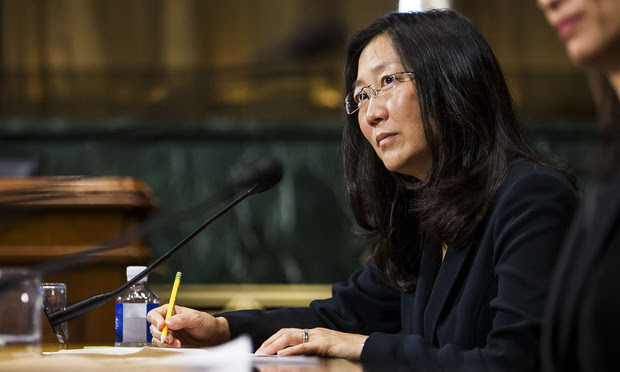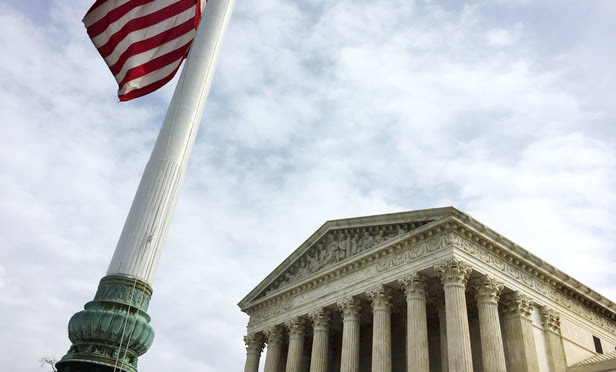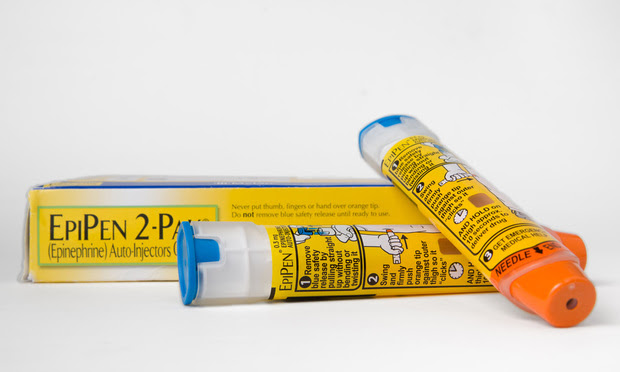Critical Mass: Disappointed to the Tune of $30M? Plus, Lead Paint Makes Splash at SCOTUS
Why did a federal judge in the Anthem data breach case award more than $30 million to plaintiffs lawyers with whom she was “deeply disappointed?” There's a lot of amicus support for lead paint companies petitioning the U.S. Supreme Court. And read on for an update on multi district litigation over EpiPen pricing.
August 22, 2018 at 12:15 PM
7 minute read
Welcome to Critical Mass, Law.com's weekly briefing on class actions and mass torts. I'm Amanda Bronstad in Los Angeles. So, why did a federal judge in the Anthem data breach case award more than $30 million to plaintiffs lawyers with whom she was “deeply disappointed?” Also, there's a lot of amicus support for lead paint companies petitioning the U.S. Supreme Court. And find out who got appointed to lead an MDL over the alleged options trading manipulation in Chicago.
Send your feedback to [email protected], or find me on Twitter: @abronstadlaw.
➤➤ Would you like to receive Critical Mass as an email? Sign up here.
“I'm Deeply Disappointed”
That was U.S. District Judge Lucy Koh reproaching plaintiffs' lawyers in the Anthem data breach case earlier this year. Last week, Koh awarded those same attorneys $31 million in fees.
That's slightly less than the $38 million plaintiffs lawyers asked for. But it's more than a special master's recommendation and, at 27 percent of the $115 million settlement, it's higher than the 25 percent benchmark for cases in the 9th Circuit.
So what gives?
Well, for one thing, Koh didn't agree with the special master on everything. She also didn't rely exclusively on billing records. Koh previously had questioned why the four lead plaintiffs firms (Cohen Milstein, Altshuler Berzon, Lieff Cabraser and Girard Gibbs) brought in 49 other law firms on the case.
But Koh looked to the percentage of the fund to calculate fees. Although she didn't think the Anthem plaintiffs lawyers should get the same percentages as those in data breach settlements involving Home Depot and Target (27.7% and 29%), she recognized the lawyers obtained “exceptional” results in a case with “novel legal issues and technical subject matter.”
I reached out to Vincent Esades (Heins Mills & Olson), who was lead counsel for consumers in the Target data breach class action. He had a unique perspective on the Anthem case:
“Anthem was extremely complex, and I thought the lead lawyers did an excellent job both litigating and managing the case efficiently. These types of cases frequently end without plaintiffs getting paid anything so sometimes I think risk of litigation, while always mentioned by courts, does not always actually get the consideration it often warrants.”
Amici Rally in Lead Paint Case
Three lead paint companies have turned to the U.S. Supreme Court to reverse a public nuisance judgment in California that could be up to $730 million. They've got a lot of help, according to my story about amicus briefs filed in the case.
My story focused on the first briefs, filed by five state attorneys general and the Washington Legal Foundation, which contend that Sherwin-Williams, Conagra and NL Industries were unfairly “stuck with the bill.” After all, the brief says, there were other companies that sold lead paint, builders and painters who used it and homeowners who failed to maintain their properties.
Since then, eight more amicus briefs have been filed, most raising concerns about due process and First Amendment rights. (The judgment was largely based on the lead companies' advertising.) They also caution against an expansion of public nuisance law. Among the entities backing the paint companies: the Pacific Legal Foundation, the Product Liability Advisory Council, the Retail Litigation Centerand the U.S. Chamber of Commerce.
And, as the Chamber brief emphasizes, there's reason to hurry.
“Just in the last twelve months, in federal courts alone, at least 80 new public nuisance cases of this sort have been filed by states and other government entities against American businesses, all seeking to impose sweeping liability based on similarly novel theories,” wrote U.S. Chamber attorney Jeffrey Bucholtz (King & Spalding). “The recent avalanche of public nuisance claims under the new California doctrine will bury American business in even greater litigation costs and burdens.”
Mylan, Pfizer Stuck in Court
Remember the outrage back in 2016 over a massive increase in the cost of EpiPens? (Those epinephrine injections in school classrooms used to treat kids with food allergies.)
Well, school's back in session—and my colleague Jenna Greene, editor of The Litigation Daily, reports here on the latest in consumer litigation against Mylan and Pfizer.
On Monday, a federal judge in Kansas overseeing MDL litigation denied a defense motion to dismiss, allowing most of the class actions to move forward, Jenna writes.
● A quick recap: Pfizer makes EpiPen, but Mylan sells the product. And from 2007 to 2016, it jacked up EpiPen's price from $100 to $600. Plaintiffs have brought antitrust, consumer fraud and RICO claims. Sanofi also has a separate antitrust action against Mylan that's been folded into the MDL.
● The ruling: In a 128-page decision, U.S. District Judge Daniel Crabtree let most of the consumer class actions proceed, though he knocked out some state law claims. Notably, he refused to dismiss the RICO claims.
● Legal lineup: Co-lead counsel for plaintiffs are Warren T. Burns of Burns Charest, Paul Geller of Robbins Geller, Lynn Lincoln Sarko of Keller Rohrbackand Rex Sharp of Sharp Law. Weil, Gotshal & Manges is representing Sanofi. The defendants are represented by Hogan Lovells; Lathrop Gage and Robbins Russell Englert.
Who Got the Work
I've got a two-fer this month on lead counsel appointments:
➤ A federal judge in Chicago appointed Kimberly Justice (Kessler Topaz) and Jonathan Bunge (Quinn Emanuel) to spearhead multidistrict litigation alleging antitrust violations against traders who allegedly rigged the Chicago Board Options Exchange Volatility Index, known as the VIX. The appointment also includes a steering committee: David Frederick (Kellogg Hansen), Hilary Scherrer(Hausfeld) and Erin Durba (Motley Rice). They'll be taking on a coalition of defense firms for the trading entities that includes Sidley Austin; Skadden Arps; Katten Muchin; Jenner & Block; Bartlit Beck; Foley & Larder; and Hunton Andrews Kurth.
➤ Meantime, a federal judge in Los Angeles approved a leadership team in class actions brought over former USC campus gynecologist, Dr. George Tyndall, accused of sexually abusing his patients. Steve Berman and Elizabeth Fegan(Hagens Berman) will lead a team that also includes Daniel Girard and Elizabeth Kramer (Girard Gibbs) and Annika Martin (Lieff Cabraser). The university is represented by Quinn Emanuel.
Here's more news you should know:
● Opioid Onslaught: Keller Lenkner has filed eight more class actions on behalf of individuals who blame their skyrocketing health insurance premiums on the opioid epidemic. The firm, joined by Edelson PC and Consovoy McCarthy Park, filed suits three months ago in New Jersey, New York, Massachusetts, Illinois and California, adding a new type of plaintiff to the opioid litigation. On Tuesday, the firms filed new cases in Texas, Missouri, Florida, Idaho, Pennsylvania, Arizona, Connecticut and Tennessee.
● Tipping the Scales? The 6th trial alleging Johnson & Johnson's baby powdercaused someone to get mesothelioma began on Monday in Los Angeles Superior Court. Here's my story. The trial comes in a case brought by California resident Carolyn Weirick, 59, diagnosed in 2017 with mesothelioma. Opening statements by plaintiff's attorney Jay Stuemke(Simon Greenstone Panatier), J&J counsel Christopher Vejnoska (Orrick) and Imerys lawyer Brad DeJardin (Dentons) delved deeply into asbestos studies but featured props like a household scale and a package of needles. Previous trials resulted in awards of $25.75M and $117M, a defense verdict and two mistrials.
● No More: Plaintiffs firms (Cohen Milsteinand Jenner & Block) saw $60.8 million in attorney feesfor a $680 million settlement in 2011 on behalf of a class of Native American farmers and ranchers alleging discrimination against the U.S. Department of Agriculture. Now, they want $3.2 million more, and the U.S. Justice Department is balking. Here's the Law.com story. Plaintiffs lawyers say the additional fees are tied to their work relating to $380 million in cy pres—unclaimed funds earmarked for third parties. The Justice Department, by the way, had urged the U.S. Supreme Court in March to deny review of the settlement despite the government's reservations about cy pres funds.
● Good with the Bad: Of the 2,000 individuals in a $300 million settlementover hypertension drug Benicar, five opted out—and it almost costone his lawyers. Thomas Cartmell, Jeffrey Kuntz and David DeGreeff (Wagstaff & Cartmell) attempted to withdraw from representingTerry McDaniel, claiming that a trial, even if they won, would cost more than any potential verdict. But a federal magistrate judge in New Jersey pushed back. “If counsel is now 'scared off' by the prospect of paying for trial, counsel should not have undertaken the representation of plaintiff in the first instance,” the judge wrote. “Counsel must accept the good with the bad.”
Thanks for reading Critical Mass. See you next week!
This content has been archived. It is available through our partners, LexisNexis® and Bloomberg Law.
To view this content, please continue to their sites.
Not a Lexis Subscriber?
Subscribe Now
Not a Bloomberg Law Subscriber?
Subscribe Now
NOT FOR REPRINT
© 2025 ALM Global, LLC, All Rights Reserved. Request academic re-use from www.copyright.com. All other uses, submit a request to [email protected]. For more information visit Asset & Logo Licensing.
You Might Like
View AllTrending Stories
- 1Thursday Newspaper
- 2Public Notices/Calendars
- 3Judicial Ethics Opinion 24-117
- 4Rejuvenation of a Sharp Employer Non-Compete Tool: Delaware Supreme Court Reinvigorates the Employee Choice Doctrine
- 5Mastering Litigation in New York’s Commercial Division Part V, Leave It to the Experts: Expert Discovery in the New York Commercial Division
Who Got The Work
J. Brugh Lower of Gibbons has entered an appearance for industrial equipment supplier Devco Corporation in a pending trademark infringement lawsuit. The suit, accusing the defendant of selling knock-off Graco products, was filed Dec. 18 in New Jersey District Court by Rivkin Radler on behalf of Graco Inc. and Graco Minnesota. The case, assigned to U.S. District Judge Zahid N. Quraishi, is 3:24-cv-11294, Graco Inc. et al v. Devco Corporation.
Who Got The Work
Rebecca Maller-Stein and Kent A. Yalowitz of Arnold & Porter Kaye Scholer have entered their appearances for Hanaco Venture Capital and its executives, Lior Prosor and David Frankel, in a pending securities lawsuit. The action, filed on Dec. 24 in New York Southern District Court by Zell, Aron & Co. on behalf of Goldeneye Advisors, accuses the defendants of negligently and fraudulently managing the plaintiff's $1 million investment. The case, assigned to U.S. District Judge Vernon S. Broderick, is 1:24-cv-09918, Goldeneye Advisors, LLC v. Hanaco Venture Capital, Ltd. et al.
Who Got The Work
Attorneys from A&O Shearman has stepped in as defense counsel for Toronto-Dominion Bank and other defendants in a pending securities class action. The suit, filed Dec. 11 in New York Southern District Court by Bleichmar Fonti & Auld, accuses the defendants of concealing the bank's 'pervasive' deficiencies in regards to its compliance with the Bank Secrecy Act and the quality of its anti-money laundering controls. The case, assigned to U.S. District Judge Arun Subramanian, is 1:24-cv-09445, Gonzalez v. The Toronto-Dominion Bank et al.
Who Got The Work
Crown Castle International, a Pennsylvania company providing shared communications infrastructure, has turned to Luke D. Wolf of Gordon Rees Scully Mansukhani to fend off a pending breach-of-contract lawsuit. The court action, filed Nov. 25 in Michigan Eastern District Court by Hooper Hathaway PC on behalf of The Town Residences LLC, accuses Crown Castle of failing to transfer approximately $30,000 in utility payments from T-Mobile in breach of a roof-top lease and assignment agreement. The case, assigned to U.S. District Judge Susan K. Declercq, is 2:24-cv-13131, The Town Residences LLC v. T-Mobile US, Inc. et al.
Who Got The Work
Wilfred P. Coronato and Daniel M. Schwartz of McCarter & English have stepped in as defense counsel to Electrolux Home Products Inc. in a pending product liability lawsuit. The court action, filed Nov. 26 in New York Eastern District Court by Poulos Lopiccolo PC and Nagel Rice LLP on behalf of David Stern, alleges that the defendant's refrigerators’ drawers and shelving repeatedly break and fall apart within months after purchase. The case, assigned to U.S. District Judge Joan M. Azrack, is 2:24-cv-08204, Stern v. Electrolux Home Products, Inc.
Featured Firms
Law Offices of Gary Martin Hays & Associates, P.C.
(470) 294-1674
Law Offices of Mark E. Salomone
(857) 444-6468
Smith & Hassler
(713) 739-1250














